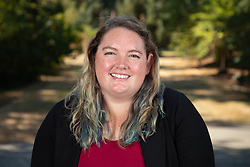Page 22 • (1,396 results in 0.045 seconds)
-
Data stored on your computer should be backed up periodically in the event of a computer failure. Copies of files can be stored on a secondary source such as a central server, portable hard drive or
BackupsData stored on your computer should be backed up periodically in the event of a computer fai
-

Recently, chemistry major Jackie Lindstrom found herself in Oxford, England, conducting a series of informational interviews with public health representatives from Oxfam and the International Organization for Migration, a United Nations advisory agency that promotes international cooperation on migration. Traveling under a Wang Center Research…
hopefully give them some helpful feedback.” Now, for her math capstone, she’s running a statistical analysis, using principal component analysis to simplify the dataset and suggest ways the U.N. agency can fine-tune their surveys and reporting. If collaborating with a U.N. agency seems unexpected for a chemistry major, for Jackie, it’s been a natural outcome from the innovative interdisciplinary approach of PLU’s International Honors Program (IHON). Through IHON, Jackie originally traveled to Oxford in
-
Most dental schools require that applicants take the Dental Aptitude Test (DAT). Students usually take the exam in the spring of the junior year prior to admission.
) website. Candidates for DAT should have completed prerequisite courses in biology, general chemistry, and organic chemistry. The exam consists of four separate parts: Natural Sciences (biology, general chemistry, and organic chemistry) Perceptual Ability (2, 3-D problem-solving) Reading comprehension (dental and basic sciences) Quantitative reasoning Specifically, the DAT consists of 280 multiple-choice test questions. The Survey of the Natural Sciences section consists of Biology (40 questions
-
Most dental schools require that applicants take the Dental Aptitude Test (DAT). Students usually take the exam in the spring of the junior year prior to admission.
) website. Candidates for DAT should have completed prerequisite courses in biology, general chemistry, and organic chemistry. The exam consists of four separate parts: Natural Sciences (biology, general chemistry, and organic chemistry) Perceptual Ability (2, 3-D problem-solving) Reading comprehension (dental and basic sciences) Quantitative reasoning Specifically, the DAT consists of 280 multiple-choice test questions. The Survey of the Natural Sciences section consists of Biology (40 questions
-
The word anthropology comes from the Greek words anthropos, meaning human, and logos, which refers to doctrine, theory or science.
Department OfferingsAnthropology Laboratory – The departmental lab emphasizes archaeological teaching and provides an excellent opportunity for students to apply scientific methods of hypothesis testing in the context of the social sciences. Among the goals of the program are to teach archaeological recording techniques, to develop an understanding of the procedures and mastery of the techniques of specific instruments, and to familiarize students with the analysis of artifacts and paleoenvironmental
-
Information & Technology Services (I&TS) provides technology, library resources, and a wide range of services, planning, and leadership in support of the university’s core teaching-learning
and provide live images to large projection screens.Qualtrics Software253-535-7525 • qualtrics@plu.edu • Web site • Support infoOnline survey tool or use by PLU faculty, staff, and students for online data collection and analysis.Sakai Learning Management System253-535-7525 • sakai@plu.edu • Web site • Support infoPLU's learning management system.Service Requests253-535-7525 • helpdesk@plu.edu • Web site • Support infoSubmit a service request for computer, phone, and network problems and
-
The Master of Science in Kinesology program is on hiatus for the 2023-24 academic year. Admission to the MS in Kinesiology is based on several criteria including academic preparation, work
.) - Graduate Courses KINS 500 : Research Methods and Application in Kinesiology The course will introduce basic concepts in research methods and experimental design relevant to the area of Kinesiology. The course is designed to create a better understanding of the principles, concepts, terminology, and instruments used in measurement and analysis in the various sub-domains of Kinesiology. The course will focus on the scientific method, addressing both quantitative and qualitative research methodologies
-
Join the Computer Science Department to hear the senior capstone presentations. Student presentations will take place Friday and Saturday.
itself around a predefined path. Utilizing a LiDAR laser scanner to observe the car’s environment, we generate a map and algorithmically guide the car through the racecourse. We utilize ROS (Robot Operating System) packages as a means to integrate our LiDAR laser scan data with the Hector SLAM (Simultaneously Localisation and Mapping) algorithm to simultaneously localize and map the location of the RC car. Using these maps, we implement our path planning algorithm (pure pursuit) and machine learning
-
D.N.P. Program for B.S.N. (Prepared Registered Nurses) The Doctor of Nursing Practice program is designed for nurses seeking a terminal degree at the highest level of nursing practice.
adhere to any deadline set by the agencies and/or the School of Nursing. Advising The DNP Program Director for the School of Nursing typically completes initial advising and program planning with interested applicants and admitted students. Post-master’s students will meet with the DNP Program Director to conduct a Gap Analysis of previous master’s coursework and develop a plan of study to meet the D.N.P. degree requirements. D.N.P. applicants are strongly encouraged to attend one of the regularly
-

Assistant Professor | School of Nursing | mcfaddsm@plu.edu | 253-535-7510 | Dr.
following elimination of nonmedical exemptions to childhood immunizations., Denver, CO (October 2021) APHA Annual Meeting and Expo, State-level policies and toddler immunization completion: A secondary data analysis., Philadelphia, PA (November 2019) Academy Health Research Conference, Exploration of data collection methods for county-level toddler immunization coverage, Washington, DC (June 2019) Western Institute of Nursing Research Conference, Inconsistency in toddler immunization completion coverage
Do you have any feedback for us? If so, feel free to use our Feedback Form.


